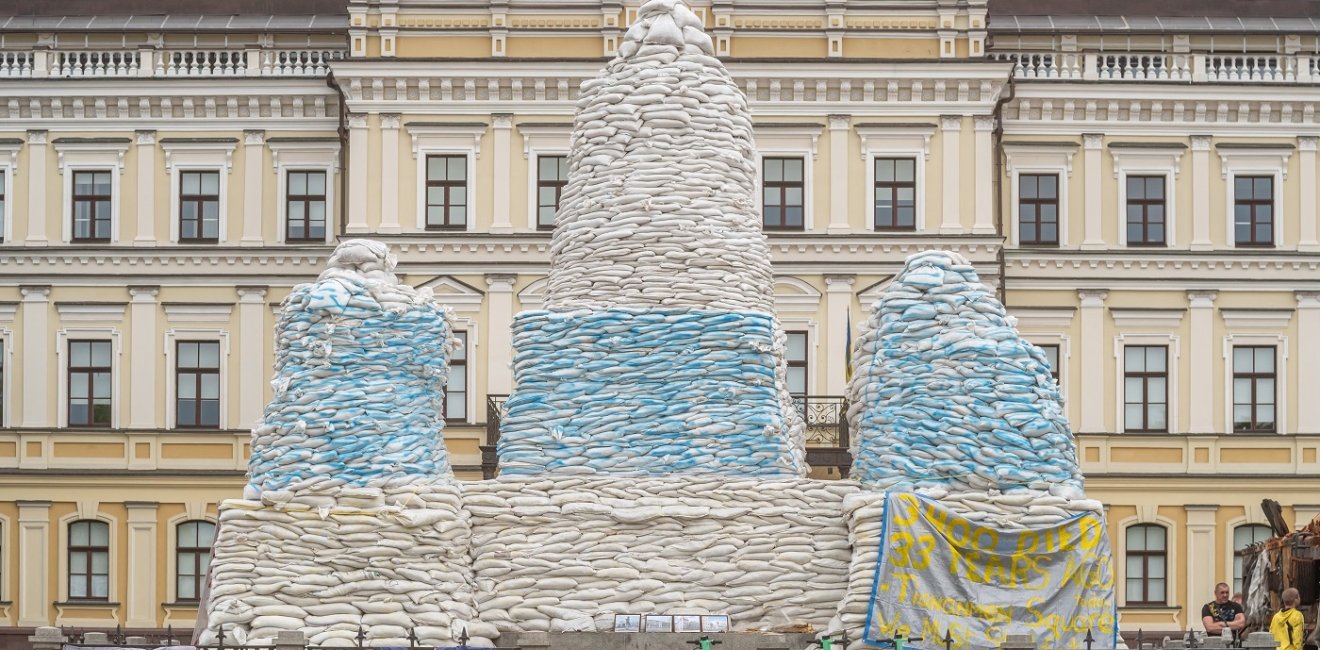
A blog of the Kennan Institute
BY FEDOR KRASHENINNIKOV
Russia’s invasion of Ukraine has turned out to be a considerably more protracted and bloody endeavor than many had expected at the start. Three months in, no end to the conflict is in sight, and observers increasingly expect the war to last for many more months in 2022 and even into 2023.
Both options, a protracted conflict or Ukraine accepting an unsatisfactory and only provisional peace deal requiring loss of its sovereign territory, with Vladimir Putin able to proclaim victory in his war of aggression, have significant drawbacks.
The latter option, however, would open the door to an extended period of global unrest should other strongmen decide to follow Putin’s lead and aggress against their weaker neighbors. Those urging Ukraine to settle should be aware of the vast and rather apparent dangers of pursuing peace at any cost.
How Things Look Now: Russia’s Rhetoric and Goals
Despite the Kremlin’s failure to achieve a quick victory, one can hardly speak of Russia’s defeat. Yes, the troops have retreated from Kyiv and Kharkiv, but the Russian army continues its offensive in the Donbas.
Russian defense minister Sergei Shoigu and the highly influential secretary of the Russian Security Council, Nikolai Patrushev, who speak on behalf of Russia’s top political and military leadership, present the protracted war as President Putin’s intentional strategy, allegedly undertaken to reduce casualties. While this framing constitutes effective acknowledgment of problems the Russian forces have faced in seizing and holding territory, it also signals Moscow’s intent to continue the war as long as is necessary to achieve Russia’s objectives.
What are those objectives? Clearly, the war is no longer about occupying all of Ukraine, including its capital city. And the confused ramblings emanating from the Kremlin about “denazification” and “preventing Ukraine’s attack against Russia,” or some other propagandistic trope, are without merit.
However, it is possible to discern clearly two real objectives that Vladimir Putin is pursuing and on which a lot of effort is being expended.
The first objective is to ensure that Russian troops reach the borders of Donetsk and Luhansk oblasts at any cost; there is no specific deadline to do so.
It is worthwhile recalling that the war was specifically launched by President Putin on the pretext of assisting the self-styled Donetsk and Luhansk “People’s Republics” in “liberating” their territories. So even if this ends up as the only goal reached as a result of the current hostilities, Vladimir Putin can easily claim that events have unfolded according to his plan. One look at the battle maps is enough to confirm that this aim is achievable, even at the current pace of the Russian offensive.
The second objective is to preserve Russia’s control over the territories in southern Ukraine that Russia has occupied since the start of the war.
This effort is primarily directed toward Kherson oblast, just north of the Crimean Peninsula, but Putin is unlikely to return other occupied territories in the south of Ukraine either, such as the important administrative and trade centers of Odesa and Mykolaiv.
Kherson is important not only for its own sake—Russian forces hold the west bank of the Dnipro river, from which it could easily launch a future invasion of Ukraine, and the river itself offers access to Ukraine’s interior—but also because the North Crimean Canal (Pivnichno-Krymskyi Kanal), which provides freshwater supplies to the Crimean Peninsula, is located in that region.
Ukraine shut down the canal in 2014, after the Russia occupation of Crimea, and water supplies were restored only with the March 2022 takeover of Kherson by Russian forces. Therefore Kherson oblast is unlikely to be returned to Ukrainian control under any conceivable peace agreement. This can now be achieved only by military means.
The regime imposed by Russian troops in the occupied Ukrainian territories is quite sustainable, with occupation authorities using force and intimidation to keep the local residents in check.
It seems obvious that the instances of violence perpetrated by Russian troops against Ukrainian civilians that have become public knowledge are only the tip of the iceberg. In the meantime, Russian state media daily present reports on Russia-friendly administrations being installed in the occupied territories, Russian passports being handed out, Russian currency being introduced, and a Russian educational system being put in place, as well as on how well the plans under way to incorporate the occupied territories into Russia are progressing.
Scenario for the Future
No doubt, after Russian troops reach the borders of Donetsk and Luhansk oblasts and the front lines stabilize in other parts of Ukraine, President Putin will start talking about the urgent need for a peace deal and will call on Ukraine to restart talks. By then Russia will be facing exacerbated economic problems as a result of Western sanctions, its human and material resources will be depleted, and Russian society will have grown tired of the long war.
Against this backdrop, Putin’s transition from aggressive to peacemaking rhetoric will further enhance the level of public trust in him. The Kremlin will make it appear as though Russia longed for peace and was ready to agree to a ceasefire at any moment but that Ukraine, backed by the West, wanted to continue the war and bloodshed.
By then the West will also have grown tired of the war and the economic problems it has caused, so Putin’s calls for peace will be met with enthusiasm by ordinary citizens, pacifists, and opposition forces, if not the political elites. Already one can hear voices in Europe and the United States calling on Ukraine to make concessions to Russia and end the war as soon as possible. These sentiments will obviously grow stronger with every month of the war.
It is important not to forget that in a situation where Russia controls significant Ukrainian territories and does not plan to return them to Kyiv’s control, any ceasefire agreement will inevitably harden the front line into a de facto border between Russia and Ukraine for many years, possibly decades, to come.
Putin will present such an agreement as his victory, and it will be difficult to argue against this framing, as Russia will indeed look to domestic audiences like a winner, having expanded its zone of control.
In such a case, Russian society may also retrospectively accept the current economic hardships as necessary for the military victory instead of treating them as meaningless suffering. And Putin himself, despite being the aggressor, will not only look like a victor, he will be treated as a peacemaker in Russia and overseas.
In the meantime, Western countries that see peace as an ultimate good will find themselves in a complicated situation. The danger of making peace on Putin’s terms is obvious. On the other hand, hawkishly demanding that the war continue until Russia is defeated is a morally difficult position as every day of war means new deaths and senseless destruction, as well as new reports in the world media about them.
Putin’s propaganda machine already employs the claim that “the West is ready to fight Russia until the last Ukrainian,” and if the conflict continues at its current pace, in a few months sentiments may start to change in Ukraine too, especially if military assistance from the West does not lead to major changes on the front lines.
The reaction of Western leaders to Putin’s calls for peace will shape international politics for years to come.
The West must be ready to support continued fighting in Ukraine, despite the Western public growing tired of the war and its economic consequences, and despite the prevailing perception of peace as an absolute value in and of itself. Agreeing to a world in which Vladimir Putin stays in power in Russia and looks like a winner in the eyes of at least some people in Russia and overseas would be expected to trigger a long era of global instability.
Resolving to stop today’s bloodshed at any cost will result in new wars in the future, and not only in Ukraine. Having exited a war of aggression as an undefeated leader who has expanded his sphere of influence, Vladimir Putin will become the role model for many other authoritarian leaders, who will also be tempted to behave in an aggressive way, not hesitating to attack their neighbors and violate international law.
The opinions expressed in this article are those solely of the authors and do not reflect the views of the Kennan Institute.
Author

Kennan Institute
After more than 50 years as a vital part of the Wilson Center legacy, the Kennan Institute has become an independent think tank. You can find the current website for the Kennan Institute at kennaninstitute.org. Please look for future announcements about partnership activities between the Wilson Center and the Kennan Institute at Wilson Center Press Room. The Kennan Institute is the premier US center for advanced research on Eurasia and the oldest and largest regional program at the Woodrow Wilson International Center for Scholars. The Kennan Institute is committed to improving American understanding of Russia, Ukraine, Central Asia, the South Caucasus, and the surrounding region through research and exchange. Read more

Explore More in The Russia File
Browse The Russia File
Chechnya as a Model of Modern Russia

Russia’s Indigenous Communities and the War in Ukraine

Gas and Power in a Changing US–Russia Relationship


